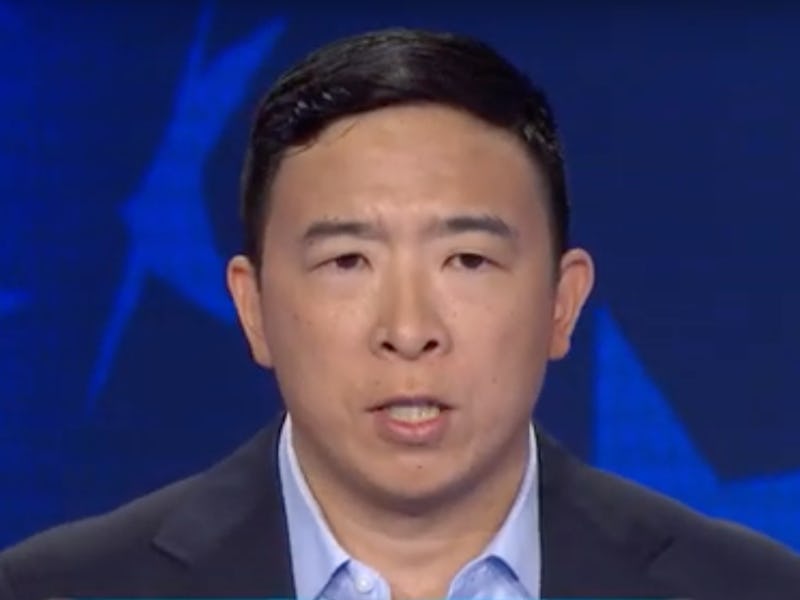Andrew Yang: 5 Moments From the UBI-Backing Candidate's Debate Appearance
Yang made his national debate debut.

Andrew Yang made his Democratic debate debut Thursday in his bid to become the next president of the United States. Yang is running on a universal basic income platform, and Thursday’s debate gave him the chance to detail his policy to a broader audience, though his long-shot status and the nine other candidates on stage made it difficult to break through.
“This is a move that we have to make, particularly as technology is now automating away millions of American jobs,” Yang said during the two-hour debate, which also featured former vice president Joe Biden and senator Bernie Sanders.
Yang’s candidacy is based around answering this growing threat of automation. In an April 2018 interview with Inverse, he described it as “the greatest technological and economic shift in history.”
He’s never held elected office, but nor did president Donald Trump or French president Emmanuel Macron. Nonetheless, his long-shot campaign depends on getting big hits during these national stage debates. Here’s how it went:
5. Yang Gets UBI Into the Conversation
Yang’s first question was obviously a quiz about his central policy: a pledge to give every American citizen over the age of 18 a $1,000-per-month stipend.
When asked how he would pay for a policy estimated to cost $3.2 trillion, he argued that Amazon and other major trillion-dollar tech firms pay basically zero in taxes while closing around 30 percent of stores. The goal would be to better redistribute the results from these successes, so more average Americans can feel their benefits.
“This is a move that we have to make, particularly as technology is now automating away millions of American jobs,” Yang explained. “It’s why Donald Trump is our president today. We automated away four million manufacturing jobs in Michigan, Ohio, Pennsylvania and Wisconsin. We’re about to do the same thing to millions of retail jobs, call center jobs, fast food jobs, truck driving jobs and on and on through the economy.”
A basic income, he explained, could make people happier and healthier. That would add an extra $700 billion to gross domestic product.
4. Value Added Tax Would Not Negate the Basic Income
Part of Yang’s policy is to pay for the basic income with a value-added tax at around half the level of Europe. That, according to his website, would equate to a 10 percent tax and about $800 billion in new revenue.
When why this tax wouldn’t simply negate the money passed out in a UBI, he noted that a recipient would have to spend a lot to eat up $12,000 per year just on value-added tax. His basic income would increase the household income of a three-person household by $36,000 per year.
“You’d still be increasing the buying power of about 94 percent of Americans,” Yang said.
3. China Trade War is the ‘Wrong Way to Go’
Yang criticized the ongoing trade war between the United States and China, arguing that it was the wrong approach to fix the country’s issues.
“I met with a farmer in Iowa who said he spent six years building up a buying relationship in China,” Yang said. “That’s now disappeared and gone forever. The beneficiaries have not been American workers or people in China. it’s been southeast Asian and other producers that have then stepped into the void.”
However, Yang did highlight issues with China’s approach to current trade relations.
“We need to crack down on Chinese malfeasance in the trade relationships, but the tariffs and the trade war are the wrong way to go,” Yang said.
2. Russia is ‘Laughing Their Asses Off’
Somewhat surprisingly, many of Yang’s best moments were on foreign policy. While Yang had strong words about China’s role in United States international relations, Yang saved his strongest criticisms for Russia.
“I think Russia is our greatest geopolitical threat,” Yang said. “They’ve been hacking our democracy successfully, and they’ve been laughing their assess off about it for the last couple of years. So we should focus on that before we start worrying about other threats.”
1. Yang Was Otherwise Quiet
Perhaps the most notable part of Yang’s appearance was how little he said. Beyond two direct questions, the candidate had little time to expand on other policies or hold other candidates up to scrutiny.
Fans noted that at the 12-minute mark, after Sanders gave an impassioned speech on his campaign could beat Trump, Yang raised his hand to give a counter-point. The speaking turn instead went to senator Kirsten Gillibrand, leading to accusations from Yang fans of unfair speaking time.
In post-debate analysis, Yang spoke the least of any other candidate in either debate. He had just three minutes of speaking time, less than second-to-last Swalwell with 4.3 minutes, and well behind Biden with 13.6 minutes.
Yang is scheduled to appear in a second round of debates that will be hosted on July 30 and 31. By far, he spoke less than any of the other candidates on the stage. If he wants to sell a policy as radical as UBI, he’ll have to figure out how to get more speaking time.